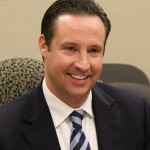
The Six Lead Architects Behind Oklahoma’s Budget
-
Joe Wertz
Fiscal year 2012 is barely underway, but lawmakers are already hard at work outlining the 2013 budget.
The process starts with agencies and analysis: What funding do specific departments need, and how much money does the state have to dole out?
Six official architects are tasked with building the framework for the 2013 budget. Here’s a look at who they are and what their roles will be.
Mary Fallin
Governor
Oklahoma’s governor has the biggest role in the budget process. Once the budget requests are in the hands of the OSF, the governor’s office works with the agencies to iron out the details. The governor considers the agency requests and works with the OSF to compile an executive budget recommendation, which is submitted to the state legislature in February.
The governor is also a member of the Equalization Board, a panel that meets 35-45 days before the legislative session to certify the amount of revenue available for appropriation.
After the legislature has taken over the budget process and determined funding for specific agencies — through various committees and subcommittees — and approved basic funding and agency-specific spending guidelines, the appropriation bills are sent to the governor, who has five days to five days to enact or veto all or any part of the bills.
After the legislature adjourns — no later than the last Friday in May — the governor has 15 workdays to sign or veto remaining bills.
Preston Doerflinger
Director, Office of State Finance

capitolbeatok.com
Preston Doerflinger and the Office of State Finance help build and adminster the budget.
Doerflinger heads up the Office of State Finance, an agency heavily involved in the budget process. By Oct. 1, agencies submit formal Budget Requests to the OSF, which analyzes and makes recommendations to the agencies and the governor.
Once the details are worked out with the specific agencies, the OSF oversees the creation of the governor’s executive budget recommendation, which is submitted to the legislature on the first Monday in February.
Once the budget has been approved by the legislature and signed by the governor, the OSF oversees money as it’s transferred between state agencies, including agency payroll, vendor payments and distribution of federal aid.
The OSF is also the point of contact for the public and media regarding information about the state of the state’s budget.
Rep. David Dank (R-Oklahoma City)

Oklahoma House of Representatives
Rep. David Dank has been a vocal member of a task force charged with eliminating unnecessary tax credits.
If you haven’t noticed, Rep. Dank has been busy at the helm of the Task Force for the Study of State Tax Credits and Economic Incentives, a mouthful of a panel tasked with examining the effectiveness of tax credits and economic incentive programs.
The 10-member task force started work in July and wraps on Jan. 1, 2012. Through the task force, Dank has already looked into a credit that provides a five-year property tax exemption for qualifying manufacturing operations, and questioned a credit that goes to home builders who construct energy-efficient homes under 2,000 square feet.
Dank is also a member of the House Appropriations and Budget Committee, which is chaired by another important budget architect.
Oklahoma House of Representatives
Rep. Earl Sears leads the House Apprpriations Committe and is a member of the tax credit task force.
Rep. Earl Sears (R-Bartlesville)
Rep. Sears is chairman of the House Appropriations and Budget Committee, a committee amongst committees that reviews budget requests from both state agencies and the governor’s office. The House Appropriations and Budget Committee oversees eight subcommittees divided among specific issue areas — education, health, safety, etc. — that determine the needs of various agencies.
Sears is also a member of the task credit task force, and made it clear to his hometown newspaper that he’s looking into the benefit of hundreds of millions of dollars in tax breaks and exemptions.
Sen. David Myers (R-Ponca City)
Despite being among lawmakers who received the least from lobbyists in 2011, Myers is an influential lawmaker that’s a member of the tax credit task force and chairs the Senate Appropriations Committee, which like its counterpart in the house, has oversight of area-specific subcommittees.
Sen. Mike Mazzei (R-Tulsa)
Like his fellow budget architects in the legislature, Mazzei has both a place on the tax credit task force and leads an influential committee: the Senate Finance Committee.
Mazzei has been critical of taxpayers subsidizing tax breaks, specifically small subsidies that are “frittered around to lots of different interest groups,” which he told The Oklahoman only present small, short-term benefits.





